Dean's Diversity Council
The George Washington University School of Business (GWSB) prides itself on being a place of belonging for students, staff, faculty and alumni originating from all across the United States and around the world, and including people of diverse racial, ethnic, national and religious backgrounds, physical abilities, learning abilities, sexual orientations and gender expressions.
As members of the GWSB community, we are committed to nurturing a positive and rewarding environment of inclusion that is open to the exploration of new ideas and celebrates and leverages our differences, which are critical components of the excellence for which we strive. We enjoy the opportunity to meet, work with and learn from others whose backgrounds, experiences and views may be different from our own. It is our ability to leverage those differences that empowers GWSB to foster the responsible management of organizations around the world.
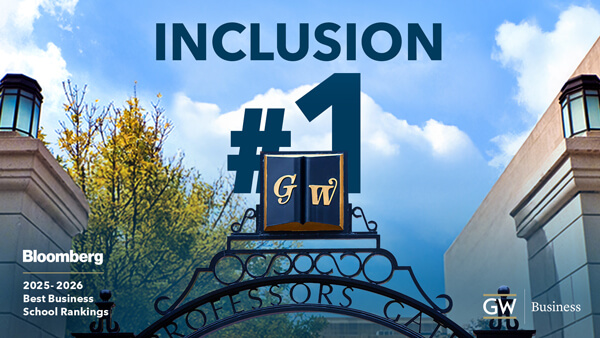

- Our Core DEI Themes
GWSB advances diversity, equity and inclusion (DEI) under four core themes:
- Inclusive and Supportive Climate & Culture
Strengthening the climate and culture where all constituents within GWSB feel supported and have a sense of inclusivity and belonging regardless of race, color, religion, sex, national origin, age, disability, veteran status, sexual orientation, or gender identity or expression. Everyone approaches each other with thoughtfulness and respect, and with values that advance diversity, equity and inclusion.
- Partnerships
Building and strengthening a diverse and inclusive community with external partnerships and external stakeholders; advancing diversity, equity and inclusion through school initiatives in partnership with external organizations, alumni and other potential contributors and stakeholders.
- Inclusive Teaching and Research
Providing and supporting teaching that is inclusive and serves the needs of all students regardless of their race, color, religion, sex, national origin, age, disability, veteran status, sexual orientation, or gender identity or expression, and supporting research that advances diversity, equity and inclusion.
- Equity and Access
Providing everyone an equal opportunity to success, creating fair, and equitable practices, enhancing accessibility and giving voice to everyone irrespective of their race, color, religion, sex, national origin, age, disability, veteran status, sexual orientation, or gender identity or expression.
Current facility information: The GW School of Business has an all-use restroom in Duquès Hall, Room 156B and a lactation and feeding room in Duquès Hall, Room 156A.
- Inclusive and Supportive Climate & Culture
- How We Define DEI
Diversity
The term diversity is used to describe individual differences (e.g. life experiences, learning and working styles, personality types) and group/social differences (including but not limited to race, socio-economic status, class, gender, age, sexual orientation, country of origin, ability, intellectual traditions and perspectives, as well as cultural, political, religious, and other affiliations) that can be engaged to achieve excellence in teaching, learning, research, scholarship, and administrative and support services.
Equity
Equity begins with understanding that many groups of people have been excluded from participating in establishing our rules and practices. As a result, these groups may not benefit equally from our systems. Equity results from changing these systemic problems by updating policies, procedures, and structures that advantage or disadvantage individuals or groups and increasing access and resources to ensure equivalent justice and fairness in the treatment of people through an impartial lens all individuals are able to succeed.
Inclusion
Inclusion describes the active, intentional, and ongoing engagement with diversity and pursuit of equity -- for all in people, in the curriculum, in the co-curriculum, and in all the communities with which individuals might connect.
- Inclusive Spaces at the GW School of Business
- Lactation and Feeding Lounge - Duquès Hall, Room 156A
- All Use Restroom - Duquès Hall, Room 156B
- Meditation and Prayer Room - Duquès Hall, Room 656
- Monthly DEI Updates From the Chief Diversity Officer
- Latest News
In the Media
- Sharon Ann Murphy, the author of “Banking on Slavery: Financing Southern Expansion in the Antebellum United States" (University of Chicago Press, 2023), led a discussion at the George Washington University explaining how deeply 19th century banks in the American South were entwined with the institution of slavery. Read the GW Today article here.
- During Hispanic Heritage Month 2023, the Dean's Diversity Council hosted a visit to "¡Presente! A Latino History of the United States" an exhibit at the National Museum of the American Latino, and a book discussion that focused on the books "The Wind Knows My Name" by Isabel Allende and "Solito" by Javier Zamora. Learn more about the events.
- Research published by Professor Herman Aguinis and GWSB alumnus Young Ji on the gender productivity gap in STEM fields was featured in a Forbes article, New Research On How We Teach STEM Is Promising. The research paper, titled "Gender productivity gap among star performers in STEM and other scientific fields," is based on an examination of the productivity of about 50,000 researchers. The authors found that female underrepresentation is more extreme among the top 10 percent, 5 percent, and 1 percent of researchers, and that women need to accumulate more resources and social capital to achieve the same level of increase in performance as men.
- Professor Jennifer Merluzzi (with co-author Adina Sterling of the Stanford Graduate School of Business) has conducted research on race, gender and job referrals that was highlighted in the Harvard Business Review.
In the Classroom
- Professor Jorge Walter teaches an elective called "Strategic Networking" in which students discuss strategic networking for minorities and other "outsiders." These insights have been used in a case discussion about Heidi Roizen, a remarkable female protagonist in the largely male-dominated (especially in the early days) Silicon Valley area.
- Professor Jennifer Merluzzi teaches a strategic management class that discusses diversity through a number of cases. Two highlights include the case of American companies KFC and Wal-Mart and their strategies of entering new markets (Asia, Europe) as well as the case of Charlotte Beers, a woman who initiated, crafted and managed a large organizational change effort to save the large ad firm of Ogilvy & Mathers (a largely male-dominated industry at the time).
Research
- One Path Does Not Fit All: A Career Path Approach to the Study of Professional Women Entrepreneurs
In this paper, authors Jennifer Merluzzi (Associate Professor of Strategic Management & Public Policy, GWSB) and Ronald S. Burt (University of Chicago) establish a career path framework to study the careers of over 800 professional women who graduated across 60 years (1938-1998) from a U.S. graduate business program. In studying their career paths, we distinguish between different types of paths women follow into, out of, and around entrepreneurship. We find that depending on the career path followed, women vary in their entrepreneurship outcomes that have been prototypically categorized as highly gendered. In particular we find that women who focus on entrepreneurship during their career have outcomes (in terms of revenue generated, number of employees, duration as well as motivations and career experiences) typically associated with masculine entrepreneurial success, while women who enact careers with side ventures in entrepreneurship have outcomes more typically associated with feminine success. In examining women entrepreneurs compared to other women and through a career path lens, we demonstrate the importance of starting from a baseline that allows for women to vary rather than a singular expectation that women make "lesser" entrepreneurs. - An article published by Professor Herman Aguinis in the journal Psychometrika provided empirical evidence that the SAT does not predict student success in the same way for Black, White, and Latinx college applicants. The article describes a study of 176 colleges and universities which demonstrated that SAT scores are in part a “mirage” because they are not an accurate representation of what is going on under the surface. Psychometrika is the official journal of the Psychometric Society, and its articles examine statistical methods, discuss mathematical techniques, and advance theory for evaluating behavioral data in psychology, education, and the social and behavioral sciences in general.
- Events & Initiatives
Upcoming Events
If there are upcoming DEI events at the GW School of Business, they will appear in the calendar below.
- Examples of DEI Teaching Statements and Code of Conduct Statements for Syllabus Language
Teaching statements and code of conduct statements set standards for the learning experience and provides an opportunity for the instructor to create a diverse, equitable and inclusive learning experience. As the teaching process for each instructor and course is different, how DEI is incorporated in a course can vary. Below are some examples of teaching statements and code of conduct statements that encompass diversity, equity and inclusion.
- Source: Professor Leo Moersen, GWSB Department of Accounting
“Diversity is crucial to an educational institution's pursuit of excellence in learning, research and service. In pursuit of those goals, a population of students, faculty, and staff with differing perspectives, backgrounds, talents and needs can lead to a richer mix of ideas, energizing and enlightening debates, deeper commitments, and a host of educational, civic and work outcomes.
Leveraging diversity is rarely achieved by accident. As individuals and as an institution, we must intentionally act to create the diverse and inclusive community that enables everyone to flourish. All members and units of the George Washington University community must advance the institution’s commitment to diversity and inclusion as a strategic priority.”
- Source: Professor Cevat Tosun, GWSB Department of Management
“Based on my thirty years of academic experience at eleven different universities in six countries located in the fourth different continents, I am very excited to observe that my students with different beliefs, cultures, colors, yearnings, hopes, and dreams diversely inspire me to bring up them in a form of a beautiful mosaic. Tourism, travel, hospitality and event-meeting industries naturally involve and accommodate diversity. In fact, diversity is one of the core principles and assets of our industry. As a professor of this global sector, it is my strategic action to serve the learning needs of all members of our learning community with diverse backgrounds and perspectives via this course in the class and beyond. Surely, my students’ diversity is considered as a resource, strength, benefit, and source of creativeness. By aiming at achieving excellence in inclusiveness, I carefully design and present learning materials and activities to be respectful of all kinds of diversity including gender, sexuality, disability, age, socioeconomic status, ethnicity, race, and culture.
Your recommendations to achieve the highest level of inclusiveness are needed and highly valued. Please cooperate with me to advance the efficiency of our course for your personal expectation, the need of your classmates, and my future students. I should underline that your unique, heroic, creative, and innovative feedback is a golden input for us to elevate our learning community to the next level. Naturally, it is also my sole responsibility to take necessary measures and facilitate for you to observe your religious festivals. Thus, please do let me know our class schedules conflict with your religious events. I would be more than happy to make the re-arrangements. Last, but not least, as human beings we all have the right to be mentioned and called with our preferred personal identity. Please feel free to specify the name that you prefer to be called and indicate pronouns with which you would like to be associated. In this context, as your professor and career development consultant, it is also my strategic intention to create a comfortable learning ecology for all my students.”
- Source: Professor Philippe Delquié, GWSB, Department of Decision Sciences
"I take diversity, equity, and inclusion to heart; but I might, unknowingly and unintentionally, fall short of it. If you feel something occurred in class, something that I or someone else said or did, that made you feel uneasy or excluded, in whatever small way, please speak to me about it. Even something that may seem a trivial violation of DEI principles is worth discussing. We should all help one another on this. Even if you are not yourself the subject of a DEI shortcoming, but you feel that there was a failure to include and/or respect someone else in our class, please tell me, I truly want to know. Those steps, no matter how small, could be the way to bring about awareness and a better environment for us all.”
- Source: The GW Elliott School of International Affairs
“To make the most of this course, we must create together a rigorous and lively forum of ideas that is welcoming to everyone. The opportunity to speak freely and know that you will be heard, even if not agreed with, is crucial. We must be careful to approach our discussions with empathy and mutual respect, irrespective of ideology, political views, or identity. We value civility because it permits intellectual, personal, and professional exploration and growth, and we want to make sure those opportunities for exploration and growth include all members of our community.”
- Source: The University of Iowa College of Education
"Respect for Diversity: It is my intent that students from all diverse backgrounds and perspectives be well served by this course, that students' learning needs be addressed both in and out of class, and that the diversity that students bring to this class be viewed as a resource, strength and benefit. It is my intent to present materials and activities that are respectful of diversity: gender, sexuality, disability, age, socioeconomic status, ethnicity, race, and culture. Your suggestions are encouraged and appreciated. Please let me know ways to improve the effectiveness of the course for you personally or for other students or student groups. In addition, if any of our class meetings conflict with your religious events, please let me know so that we can make arrangements for you."
- Source: University of Michigan, Center for Research on Learning and Teaching
"All people have the right to be addressed and referred to in accordance with their personal identity. In this class, we will have the chance to indicate the name that we prefer to be called and, if we choose, to identify pronouns with which we would like to be addressed... I will do my best to address and refer to all students accordingly and support classmates in doing so as well."
- Source: University of Pennsylvania - Dr. Zahra Fakhraai, Associate Professor of Chemistry
“Please remember that groups are only effective if everyone treats each other with respect. You are encouraged to communicate your thoughts, but please also allow others in your group to also express their thoughts. You will be surprised how much you can learn by mutual respect of each other’s ideas, even if you are knowledgeable about a subject. Remember that you learn best by teaching a subject. Try to be receptive to constructive criticism, and open about accepting mistakes. Please come to the class prepared and take ownership of your group’s success.”
- Source: California State University
“Students in this class are encouraged to speak up and participate during class meetings. Because the class will represent a diversity of individual beliefs, backgrounds, and experiences, every member of this class must show respect for every other member of this class.”
- Source: Yale University - Dr. Rona Ramos, Lecturer and Graduate Services Coordinator in Physics
“This class strives to be an inclusive community, learning from the many perspectives that come from having differing backgrounds and beliefs. As a community, we aim to be respectful to all. We reject all forms of prejudice and discrimination, including but not limited to those based on age, color, disability, gender, gender identity, gender expression, national origin, political affiliation, race, religion, sexual orientation, and veteran status. Faculty and students are expected to commit to creating an environment that facilitates inquiry and self-expression, while also demonstrating diligence in understanding how others’ viewpoints may be different from their own.”
- Source: Brown University, Sheridan Center for Teaching and Learning
“The Sheridan Center supports an inclusive learning environment where diverse perspectives are recognized, respected, and seen as a source of strength. Certificate II seeks to present a variety of diverse perspectives within the scholarship of teaching and learning (SOTL) and through our seminar discussions. The seminar will address diversity considerations for course design and student engagement along a number of dimensions, including race, ethnicity and national origins, gender and gender identity, sexuality, socio-economic class, age, religion, and disability. Seminar participants who have a disability or other condition necessitating accommodation are encouraged to discuss their needs with the instructor.”
- Source: The GW Elliott School of International Affairs
“Classroom Code of Conduct: Higher education works best when it encourages a vigorous exchange of ideas in which all points of view are heard. Free expression in the classroom is an integral part of the process. At the same time, this process is most effective when all approach the enterprise with empathy and respect for others, irrespective of their ideology, views, or identity. I encourage you to report bias incidents here. GW’s Statement on Student Rights and Responsibilities includes an emphasis on freedom of expression.”
- Source: Whitman College
“The topics that we’re covering in this class are often difficult, not just intellectually but emotionally. While I expect there to be rigorous discussion and even disagreement in the course of our class discussions, I ask that you engage in discussion with care and empathy for the other members in the classroom. Aim to disagree without becoming disagreeable. In this class we will not shy away from the uncomfortable. Critically examining and assessing our most basic assumptions and values is not just one of the tasks of philosophy but is an activity vital to living an authentic life. I urge you to have the courage to the uncomfortable in this class. In exchange for your courage, I will work to ensure a classroom environment that supports your taking these intellectual and emotional risks.”
- Source: Alisse Portnoy, Introductory-level English class, University of Michigan
"In our structured and unstructured discussions and dialogues, we also will have many opportunities to explore some challenging issues and increase our understandings of different perspectives. Our conversations may not always be easy; we sometimes will make mistakes in our speaking and our listening; sometimes we will need patience or courage or imagination or any number of qualities in combination to engage our texts, our classmates, and our own ideas and experiences. Always we will need respect for others. Thus, an additional aim of our course necessarily will be for us to increase our facility with the sometimes difficult conversations that arise as we deepen our understandings of multiple perspectives – whatever our backgrounds, experiences, or positions."
- Source: Centenary College of Louisiana
“We value human diversity in all its richly complex and multi-faceted forms, whether expressed through race and ethnicity, culture, political and social views, religious and spiritual beliefs, language and geographic characteristics, gender, gender identities and sexual orientations, learning and physical abilities, age, and social or economic classes. We respect the value of every member of the class, and everyone in the class is encouraged to share his or her unique perspective as an individual, not as a representative of any category. Multicultural and intercultural awareness and competencies are key leadership skills, and we intend to present material and classroom activities that respect and celebrate diversity of thought, background, and experience. College is supposed to challenge assumptions and to provide new and sometimes uncomfortable ways of looking at issues, but if you feel uncomfortable regarding content or perspectives that are presented or discussed by professors, guest speakers, or other students we encourage you to contact one of your instructors immediately so that we can discuss those feelings. We would like to use your preferred language when addressing you, so please let us know if your preferred name (or the pronunciation of that name) differ from what we are using and we ask that each of you let us know your preferred gender pronouns. Your suggestions on how to incorporate diversity in this course in a meaningful way are appreciated and encouraged.”
- Source: Professor Leo Moersen, GWSB Department of Accounting
- Further Resources
Neurodiversity Panel - 2025 GWSB Diversity & Allyship Week
This engaging panel discussion on neurodiversity took place online during Diversity & Allyship Week, February 3-7, 2025.

2025 GWSB Diversity & Allyship Week
GWSB is proud to host this annual series of events organized around the goal of cultivating dialogue and increasing awareness about the vital importance of ensuring that DEI is foundational to the development of institutions. View all 2025 Diversity & Allyship Week events.
George Talks Business with Rayvon Fouché
For a special George Talks Business installment ("Transforming Tech Innovation with Inclusive Perspectives") during Diversity & Allyship Week, join Interim Dean Vanessa Perry as she sits down with Rayvon Fouché, associate dean for graduate education at Northwestern University's School of Communication, to discuss the intersections of cultural representation, racial identity and technoscientific design.
Meet Our Team
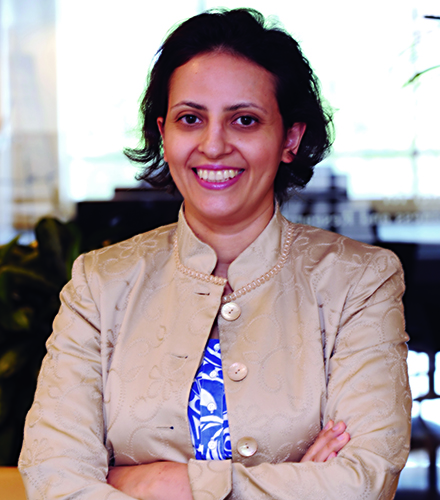
- Professor of Finance
- Professor of Decision Sciences
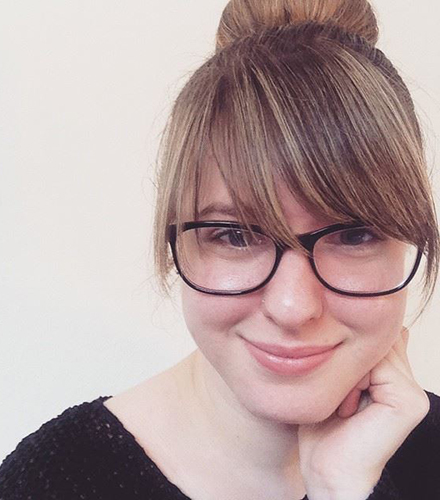
- Program Associate, International Student Services

- Assistant Director of Recruiting and Admissions
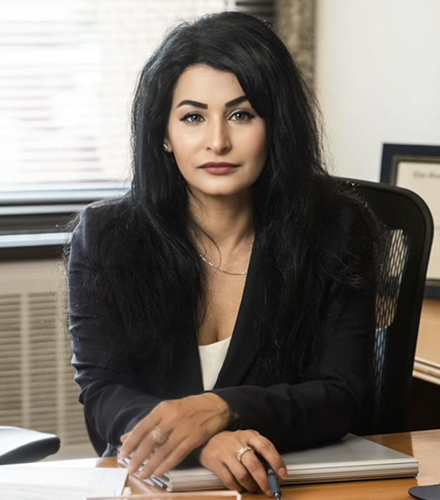
- Teaching Assistant Professor of Information Systems and Technology Management
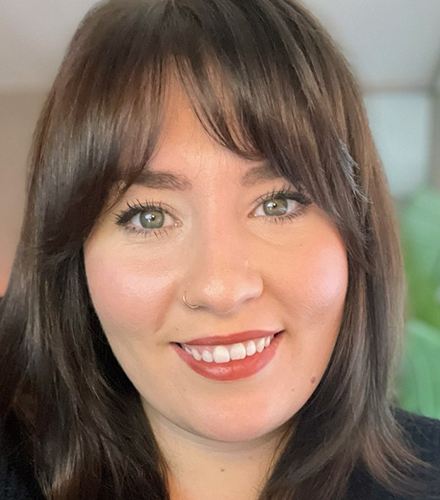
- Employer Development Consultant
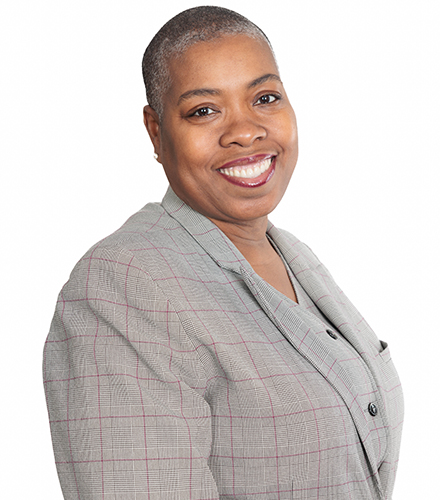
- Administrative Manager, The F. David Fowler Career Center

- Director, Capital Markets
- Associate Industry Professor of Decision Sciences

- The Lindner-Gambal Professor of Business Ethics
- Professor of Strategic Management & Public Policy

- Associate Teaching Professor of Management

- Assistant Director, Co-Curricular Learning

- Assistant Program Director, Graduate Programs
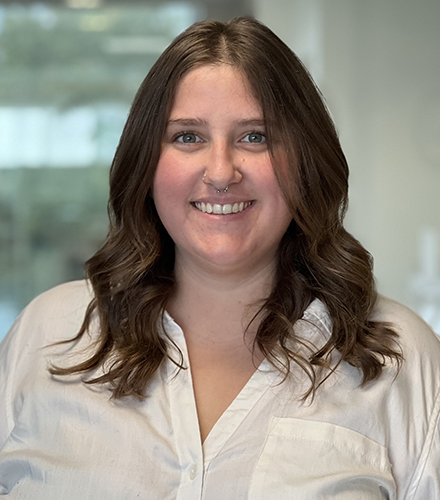
- Academic Advisor
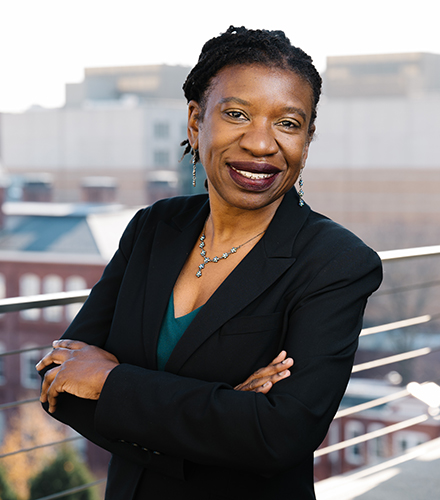
- Interim Vice Dean
- Professor of Marketing
- Professor of Strategic Management & Public Policy

- Associate Professor of Finance

- Professor of Hospitality Management

